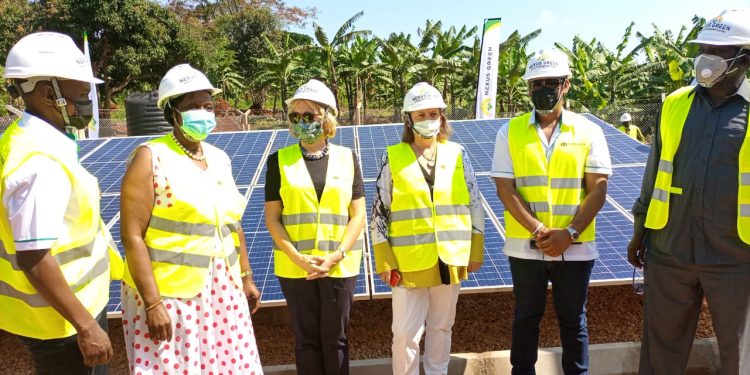The Ministry of Water and Environment is taking on solar powered water supply and irrigation schemes to help farmers deal with the unpredictable weather changes that cause them tremendous losses. This it is doing in collaboration with a British company, Nexus Green Limited.
Nexus Green is a 6year old British company that specializes in solar energy and the project being worked on is in partnership with the Ministry of Water and Agriculture, where they are doing upto 678 sites of solar irrigation across Uganda.
The project is one meant to design, supply and to install solar powered water supply and irrigation systems.
It is in the scope of climate change. This is the largest project the ministry is doing in this regard according to the CEO of Nexus Green Ltd, Honorable Rikki Verma.
The project is funded by the UK government and the Ugandan government. According to Permanent secretary Alfred Okot Okidi, the total cost of the project is 95million euros and the project is expected to be concluded in 3years.
The solar panels at the Mukono site produce 19.8KW worth of power which help pump water to an 87,000litre tank. They are six solar panels at the site. “The procedure is you assess the site and determine the amount of water that is in the ground (yield which is how much water can be produced every hour) and then use that information to determine how much water you will pump therein how much energy you will need to pump it.
This determines the number and size of the solar panels.” Said Mr. Morris Barigye, a technical and electrical engineer. The tank supplies the water sprinklers which water the plants all throughout the year.
Verma noted that the important thing is to have constant yields because of the unpredictability of the climate. So solar irrigation provides a constant annual supply of water hence covering the dry spells too. Value addition comes in where when farmers produce excess, they can then send it to a processing company that will package and send it into the market.
“This is a very good project for the locals because we plant from 1st January to 31st December and we get high profits all year round,” said Gladys one of the project beneficiaries. She added that the water could also be used for domestic purposes.
” I really want the youth of Uganda to get into agriculture because that’s where you can make some serious money that makes commercial sense that is sustainable. So, it’s not here today and then gone tomorrow. When you have a next generation, you can pass something on” said Hon Rikki Verma. Nexus also plans to follow up on the integrity and quality of installation at the irrigation sites that it is paramount.
The British company also plans to build the first solar manufacturing plant of panels.
“As a government, as much as we want to address the issue of climate change, we tend to go green. We are not only cautious of technology that can conserve our environment but also add value and sustain the livelihood of Ugandans,” said the State Minister for the Environment, Beatrice Atim Anywar.
“Levels of pollution and green house gases at the global level are changing the weather patterns around the world hence the unpredictability of the weather,” said Janet Rogan, the UK COP 26 Regional Ambassador for Middle and East Africa, in relation to climate change and farming.
Finally, there is a vegetation replacement plan in place to replace the vegetation that has been cleared to create room for irrigation farming and the solar system, for which natural vegetation had to be cleared.





